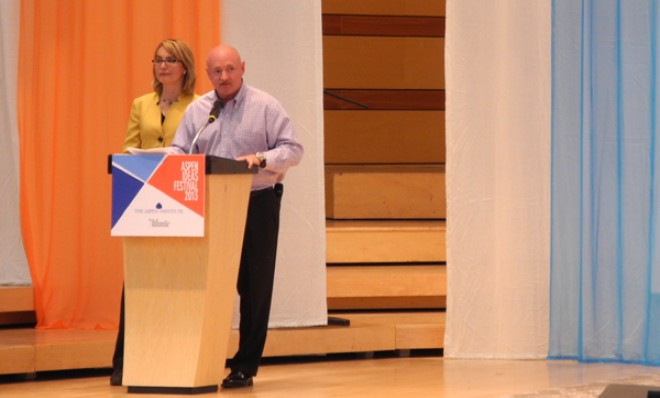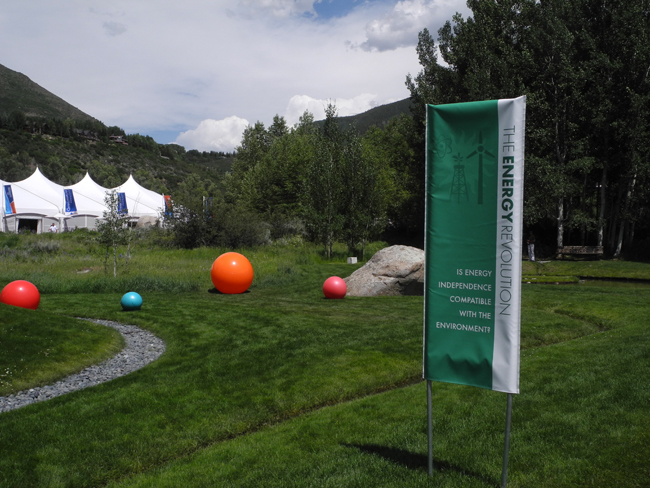5 futuristic concepts from the Aspen Ideas Festival that might change your life
Unlocking the mystery of dark matter, the pursuit of flying cars, and more

A free daily email with the biggest news stories of the day – and the best features from TheWeek.com
You are now subscribed
Your newsletter sign-up was successful
From June 26 to July 2, the Aspen Ideas Festival took over The Aspen Institute's sprawling mountain-side campus in Aspen, Colo. Historically known for its conversation around political economy as well as its wealthy crowd of entrepreneurs, businesspeople, and impressively named families, the festival has also become a place to unveil and discuss big ideas in the spheres of economy, policy, technology, and design.
Here are some of these Big Ideas. Some of them may well change your life.
1. Flying cars and the future of transportation
The Week
Escape your echo chamber. Get the facts behind the news, plus analysis from multiple perspectives.

Sign up for The Week's Free Newsletters
From our morning news briefing to a weekly Good News Newsletter, get the best of The Week delivered directly to your inbox.
From our morning news briefing to a weekly Good News Newsletter, get the best of The Week delivered directly to your inbox.
Multiple panels focused on the future of transportation. One of the most memorable was on the policy, infrastructure, and social hurdles we as a country and society will have to leap to make driver-less cars — and maybe even one day flying cars — a real possibility. Among the key questions: Is Silicon Valley underestimating the complexity of the issue? Still, some of these new technologies are very real. Check out this alternative version of a motorcycle, a C-1, launching in San Francisco soon.
2. Self-health tracking
Dr. Joel Dudley of Mount Sinai gave a speech about precision medicine. Dudley had his own DNA mapped, and showed how he discovered one of the medications he was taking was actually making him sicker (due to an abnormal gene). Though the cost is prohibitive for now, if everyone mapped their personal genomics, then health care — both preventative and diagnostic — would be personalized and subsequently profoundly different. Check out Dudley's book here.
3. America's green energy future
A free daily email with the biggest news stories of the day – and the best features from TheWeek.com
Of the many energy and clean technology talks at the festival, Hal Harvey's was the most compelling. The CEO of Energy Innovation presented dire projections around climate change. But he also emphasized that if we as a society act rapidly, new clean energy technologies can help mitigate the impact CO2 has had on our atmosphere and oceans. In under a decade, Germany has gone from getting 6 percent of its energy from renewables to 80 percent. The most striking point Harvey made regarding the U.S. was around natural gas; although he's not excited about the method by which we're extracting it from the ground, he thinks it's defensible if we're using it in the most effective and efficient way possible — to power electric plants.

4. The dark matter mystery
Dark matter and dark energy, often described as the glue that holds the universe together, make up 95 percent of the universe. (Read more about dark matter here.) Richard Massey spoke about how the large hadron collider at CERN, underground detectors, satellites that can detect gravitational warps, and even high-altitude balloons over Canada are helping us learn more about these mysterious forces. Why is this so important? Dark matter is one of the greatest mysteries in all of physics — unlocking this riddle could give us a trove of information on all sorts of scientific and space-related issues.
5. Preparing for asteroids
Remember when a small asteroid exploded in the Siberian sky, injuring more than 1,000 people? Scientists and policy folk speaking at the festival say we can predict asteroids and deflect them with enough warning. But the question is, who should be monitoring them? Is this the responsibility of the government or private sector? The more time we take talking about who should do it, the more opportunity another bugger has to venture to Earth's atmosphere. The technology to prevent these disasters exists — someone just has to take the lead.
Erica Berger spends her time building a better internet and helping craft and tell compelling stories about people, places, and ideas. She is a Brooklynite, by way of Chicago and Los Angeles.